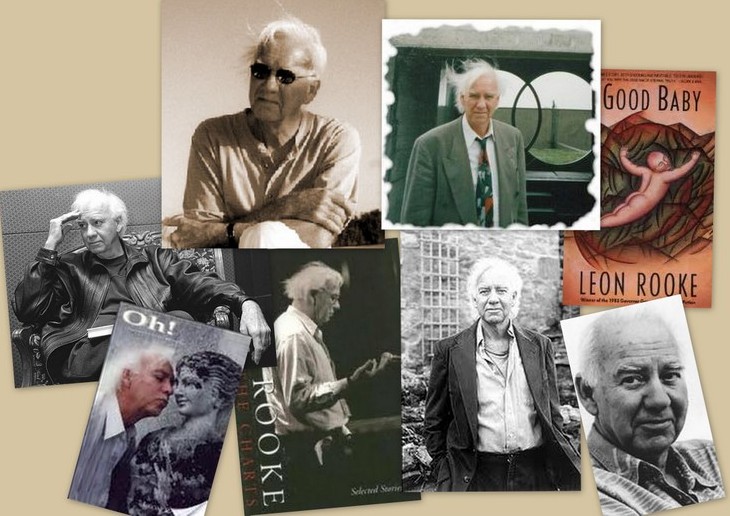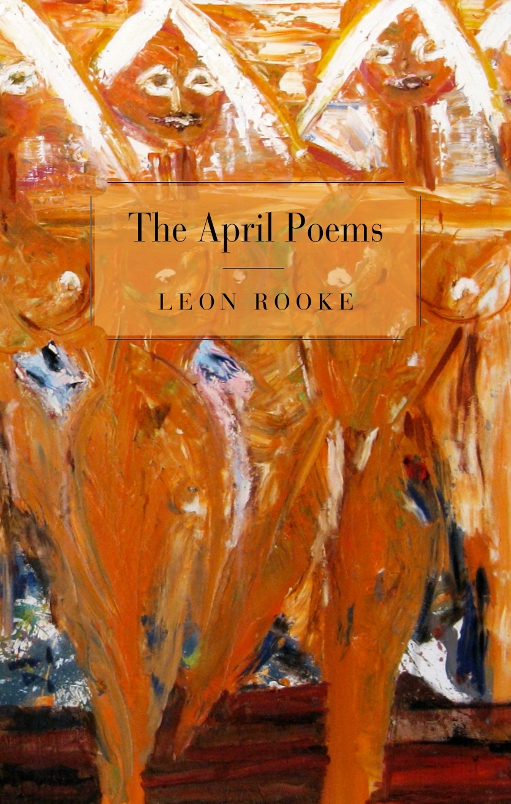These are a scatter of The April Poems, not many, and Leon Rooke has a whole book of them coming out in, well, April, with The Porcupine’s Quill. April is the eponymous heroine of this book, these poems, the words of which Leon channels with oracular aplomb.
April always wrote in a good clear hand:
Grass is first to hold the snow.
Blue lilac on my window did grow.
The girls drove me crazy today,
So did so and so.
April has three daughters who drove her crazy and still do, her past is dubious and fraught, but former admirers dog her with passion.
next time you’re in trouble
breathe deeply and I’ll be on your bumper
like a hurricane.
Rooke writes with a mix of the vernacular, the colloquial, and the intimate informal, salted with speech rhythms from his North Carolina roots and an aphoristic flair that makes every line a surprise and a delight right up to the point, the quintessential Rooke moment, when the words become other than what they seem and he reaches for some extraordinary truthful mystery.
Dear Tate: It is a lie that beautiful words have disappeared. I have myself a trunkful
in the attic, and thousands more buried underground. April has a stash in small jars
in the pantry, falsely labeled Spices. The girls hide theirs in nine teacups in the three
doll houses, No Admittance To Anyone, Many fine words, luminous phrases, died
on the battlefield. Pirates stole many. Coiled serpents, oiled evangelists. The Pentagon
has ten thousand, no food, no water, locked up in distant prisons. In some cities
ebullient words thrive – Moose Jaw, Sioux City – living on chocolate eclairs, butternut
bread, turnips. They are home before dark. They dislike fanfare.
The cover image is from one of Rooke’s own paintings, a sampling of which you can find on the NC Art page.
dg
§
39. April and the Bad Bees
A woman in the laundromat said to April, The bees are truly nasty this year.
April was quite at a loss in what manner to reply, then noticing the speaker
was addressing another woman to her rear, though only because this other woman
replied to the first, Yes, I have never seen them so bad as this year. I do not believe
these are our standard-type bees. No, these are mating bees, said the first, both
women then settling heavy glances on April and her triplet daughters occupying
a three-seater pram. April inserted another quarter in the drier. The women sat in
green plastic chairs, talking away about the nasty copulating practice of these
repugnant bees, being quite explicit, even vulgar, even pornographic, was April’s
thought, not liking either the glances coming her way, as though she personally
was to blame. They swarm a person, this one woman said, they hold her down
until all have had a go at her, and then they swarm away and do the same
to someone else and no one says a word. Yes, the other said, it is even worse
at my house. They tie us to the beds, they sup on our toes, they regard us as slaves,
even the mites have noticed. Whereupon the women fell silent for some few moments,
content to watch clothes swirling in the driers. April’s triplets whimpered.
Then the one woman said, What I think is that this queen bee business
is a lot of rubbish. No queen in her right mind would permit such appalling
behavior. You think it is a king, then? asked the second. Why, of course,
came the rejoinder, some nasty despot king, have you not known them by the
thousands? The two women at this point rutting a final malevolent glance
upon April, then lifting their wings and flying off into abysmal night.
40. April’s Clunker Car
conked out on a high rise
not that far from Indian Country,
where she knew people. A tow-truck guy,
there in an instant, said he’d noticed her condition
round about the Tonawanda River
up by Singalong, the best part of three days ago.
April in the cab beside him, he confessed
he’d been on her tail pretty much the whole of her life.
I ought to have married you and not that other party,
he said, not to claim I could have done any better
at the time and not that there’d been any chance
of getting out of the thing
without losing my kids.
They are doing okay, he said,
about the same as yours.
Nice to see you holding up so well.
Yup, well, here you go, he said,
pulling into a hustling hub,
next time you’re in trouble
breathe deeply and I’ll be on your bumper
like a hurricane.
41. On the Ropes
Love needs new shoes
but is out of work.
Last night love was arrested,
Drunk, Your Honour,
leaning against a lamppost.
Did she resist your advances?
Yes, she did, now you mention it,
plus she spat on my boots,
vile language, too.
Take her to an alley, the judge said,
beat her to a pulp.
Love staggered away blind
hot wires barbed in her breast
some bones broken
and now naked of foot
in fact naked head to toe
bleeding rather a lot.
Not that anyone much looked:
pretty autumnal day
old bruised ugly broad
bent like that.
42. April’s Deep Remorse
has as cause three grown-up daughters
who last night received a lifetime ban
from the Epicure on Queen Street.
They claim innocence: we were meek ravens
with barely a chirp. It was that theatre bunch
settling old scores, flit and flame
and hands up the dress. Troubled Gertrude,
hemlock ear, Cassandra’s bitter tongue:
your mistresses do nothing but eat ice cream
all day! You would not cross the room
to spit if my very heart was on fire!
Your Master splits His own tongue!
His flaws are greater than the sum of yours!
Seven police cars racked the chains on twelve.
Lady, didn’t I just arrest you? The Epicure
is the latest haunt hobbling April’s troupe.
Not even the Brunswick House
will have them. We can’t go anywhere.
Devout Muslim, Devine Bastards,
kicked us out. Ratsuck Tim Horton’s too
43. April Affirms She Married Well
I was his pearl of a girl
his twenty-piece orchestra
with perfect legs
his long hedge with naughty blooms
lithesome gypsy curse
spritely gin fizz
his bright sun
bursting
…….every pane
44. Thou Beside Me Singing
April’s friend, Tate, wanted to know
where went the lofty rhymes, the shimmering radiance
in a poem’s long ago. He liked those words cadenced light as a bird,
say one of those that can hold still against raging wind, stop and start
words from an eloquent brain, a humming bird, April thought he meant.
Fancy syllables espaliered onto a page
like a peach tree clutching a drain? Yeah, something like that,
Tate said, but making sense, you know, ordinary sense, like
I don’t have to get out my Ph.D. Pretty words, like you’re the critic,
where did they go?
………………………………………+
……April always wrote in a good clear hand:
……Grass is first to hold the snow.
……Blue lilac on my window did grow.
……The girls drove me crazy today,
……So did so and so.
………………………………………+
April said to Tate, I keep my best words in a drawstring bag around my neck.
………………………………………+
Those were the days.
She didn’t say when.
………………………………………+
She was ever at us, this intelligent woman poking the hornets’ nest.
………………………………………+
Don’t wake the triplets. They’ll never get back to sleep.
Those girls sleep too much.
If you had to chase them you wouldn’t think so.
I wore myself out chasing you.
Liar, liar, what’s on fire.
………………………………………+
Tate is waiting. Tate, the dolt.
Dear Tate: It is a lie that beautiful words have disappeared. I have myself a trunkful
in the attic, and thousands more buried underground. April has a stash in small jars
in the pantry, falsely labeled Spices. The girls hide theirs in nine teacups in the three
doll houses, No Admittance To Anyone, Many fine words, luminous phrases, died
on the battlefield. Pirates stole many. Coiled serpents, oiled evangelists. The Pentagon
has ten thousand, no food, no water, locked up in distant prisons. In some cities
ebullient words thrive – Moose Jaw, Sioux City – living on chocolate eclairs, butternut
bread, turnips. They are home before dark. They dislike fanfare.
—Leon Rooke
———————-
Leon Rooke has published more than 30 books, including novels, short story collections, plays, anthologies, and “oddities,” and more than three hundred short stories. Rooke’s many awards include the Governor General’s Award for Fiction (for Shakespeare’s Dog, 1985), the Periodical Association of Canada Award for the English-Language Paperback Novel of the Year (for Fat Woman, 1982), a Pushcart Prize (1988), the North Carolina Award for Literature (1990), and the Canada/Australia Literary Prize in 1981, for his body of work. Also the W. O. Mitchell Literary Award, for his writing and his mentoring, and the ReLit Short Fiction Award. Rooke has taught at more than a dozen Canadian and U.S. universities. He lives in Toronto.


30 years away from Fort Sanity, and I find you still singing. Where does Alice live now? And who is this editor of number5magazine who claims to have been one of us, still lost in the Calling Hills? Isn’t it time for a world-wide reunion of all the Alices?